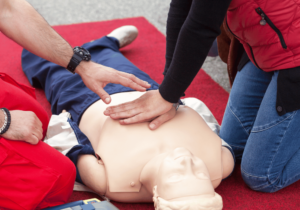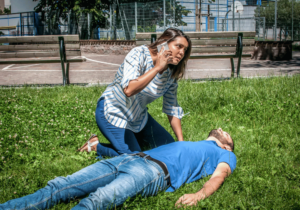No one knows when an emergency will happen, but that doesn’t mean you can’t be prepared. In this post, we will discuss 8 basic first-aid skills that everyone should learn. Keep reading to improve your first aid knowledge. These tips can be useful during common medical emergencies.
1. CPR: Cardiopulmonary resuscitation
 When someone’s breathing or heartbeat have ceased, (CPR) is a life-saving method that is applied. Chest compressions and rescue breathing are used to assist circulate oxygenated blood throughout the body.
When someone’s breathing or heartbeat have ceased, (CPR) is a life-saving method that is applied. Chest compressions and rescue breathing are used to assist circulate oxygenated blood throughout the body.
2. Bleeding Control
The ability to control bleeding is essential for first aid care, as uncontrolled bleeding can cause serious medical issues, including death. Different techniques are used for controlling bleeding, such as direct pressure and elevation of the affected area above the heart level.
3. Dressing Wounds
Properly dressing wounds helps reduce pain and risk of infection by keeping dirt and bacteria out. To dress a wound, use a sterile gauze pad and apply pressure with a bandage or dressing to the area.
4. Treating Burns
In the event of a burn, it’s important to cool the area as quickly as possible with cold water (not ice) for at least 10 minutes. Cover the area with a sterile dressing and seek medical attention promptly.
5. Fracture Care
If someone is suspected of having a broken bone, it is important to immobilize the limb until further medical help can arrive. This can be done by using splints, slings or other materials, placed close to the injured limb but not directly on it.
6. Poison Control
Exposure to toxic substances can occur in both the home and workplace. If someone is exposed to a poison, it’s important to stay calm. Depending on the type of exposure, seek medical attention immediately or follow instructions from your local Poison Control Centre.
7. Heatstroke Prevention
 Heatstroke occurs when a person’s body temperature rises above 40°C (104°F). It is potentially fatal if not treated quickly, so it’s important to recognize the signs of heatstroke such as confusion, dizziness, nausea, and red skin. To prevent this condition, ensure you drink plenty of water during hot days and avoid strenuous physical activity during peak temperatures.
Heatstroke occurs when a person’s body temperature rises above 40°C (104°F). It is potentially fatal if not treated quickly, so it’s important to recognize the signs of heatstroke such as confusion, dizziness, nausea, and red skin. To prevent this condition, ensure you drink plenty of water during hot days and avoid strenuous physical activity during peak temperatures.
8. Choking Management
Knowing how to manage choking is important for both adults and children. If someone is choking, encourage them to cough first. For more serious cases, use abdominal thrusts (commonly known as the Heimlich maneuver) to try and push air out of the lungs.
By familiarizing yourself with these 8 essential first aid skills, you can be better prepared to deal with medical emergencies that may arise in your daily life. Learning these life-saving techniques can help give you peace of mind knowing that you are able to help others in need.

